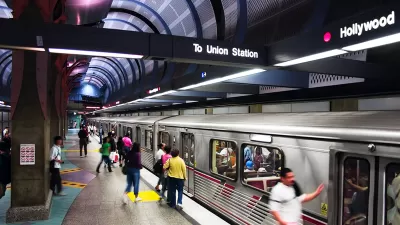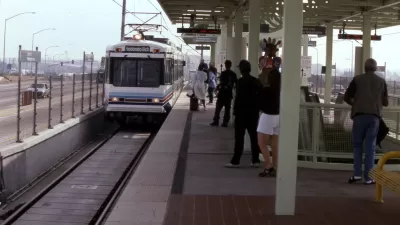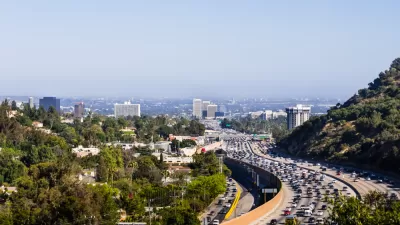The Sepulveda Transit Corridor could offer tens of thousands of Los Angeles commuters an alternative to the infamously congested I-405 freeway, if local officials can find the funding.

"Building a transit line through the Sepulveda Pass, one of the worst traffic bottlenecks in Southern California, could cost more than $13 billion, a figure significantly higher than previous estimates," reports Laura Nelson.
That leaves the project with a potential funding gap of $8 billion, according to the new cost estimate released by Los Angeles County officials this week. "The project has about $5.7 billion earmarked from Measure M, the sales tax increase that county voters approved in 2016," according to Nelson. Federal and state funds will be necessary to fill the funding gap.
"The cost estimate for the project was far lower when Metro officials compiled a funding list for Measure M in 2015," notes Nelson. Another figure that has changed in reports on the project: the amount of funding Metro has to spend on the project. Writing for Metro in January 2019 to announce refined plans for the project, Steve Hymon said the transportation agency had $10 billion to spend on the project.
For more, timely information on Measure M, see also an Eno Center for Transportation report published this week on the lessons of the Measure M campaign that convinced a supermajority of voters to approve the funding measure.
Nelson provides a lot more details on the numerous alternatives still in play for the project, including routing alternatives and funding and operations proposals that include partnering with the private sector to build, operate, and maintain the project. There is also a monorail in play.
FULL STORY: Cost of Metro transit line through the Sepulveda Pass could reach $13 billion

Alabama: Trump Terminates Settlements for Black Communities Harmed By Raw Sewage
Trump deemed the landmark civil rights agreement “illegal DEI and environmental justice policy.”

Study: Maui’s Plan to Convert Vacation Rentals to Long-Term Housing Could Cause Nearly $1 Billion Economic Loss
The plan would reduce visitor accommodation by 25% resulting in 1,900 jobs lost.

Planetizen Federal Action Tracker
A weekly monitor of how Trump’s orders and actions are impacting planners and planning in America.

Wind Energy on the Rise Despite Federal Policy Reversal
The Trump administration is revoking federal support for renewable energy, but demand for new projects continues unabated.

Passengers Flock to Caltrain After Electrification
The new electric trains are running faster and more reliably, leading to strong ridership growth on the Bay Area rail system.

Texas Churches Rally Behind ‘Yes in God’s Back Yard’ Legislation
Religious leaders want the state to reduce zoning regulations to streamline leasing church-owned land to housing developers.
Urban Design for Planners 1: Software Tools
This six-course series explores essential urban design concepts using open source software and equips planners with the tools they need to participate fully in the urban design process.
Planning for Universal Design
Learn the tools for implementing Universal Design in planning regulations.
Caltrans
Smith Gee Studio
Institute for Housing and Urban Development Studies (IHS)
City of Grandview
Harvard GSD Executive Education
Toledo-Lucas County Plan Commissions
Salt Lake City
NYU Wagner Graduate School of Public Service





























